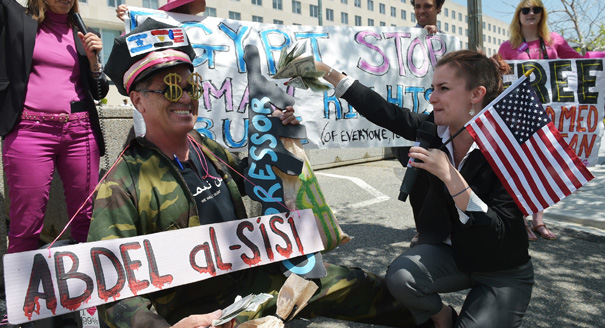Egyptian President Abdel-Fattah al-Sisi visits Washington today, where he will meet with U.S. President Donald Trump. According to a White House official, Trump will seek to “reboot” ties with Cairo, after they had deteriorated during Barack Obama’s presidency.
Perhaps Trump should prepare by reading what Carnegie Middle East Program Director Michele Dunne wrote in Diwan last December, in an article titled “Christmas After January?” She warned that Trump should understand “that the more the United States gives Sisi without getting something in return, the more Sisi is likely to demand.” As a primer for the meeting, readers might also want to consult a number of other Carnegie reports and Diwan articles on Egypt published in recent months.
According to the New York Times, Trump does not intend to allow human rights to become a point of contention with Egypt. Carnegie scholars have been less diffident about addressing topics such as declining pluralism and the rise in authoritarianism. The most recent report on Egypt is by Dunne and Senior Fellow Amr Hamzawy, titled “Egypt’s Secular Political Parties: A Struggle for Identity and Independence,” released on March 31. In mid-March Hamzawy had published another paper, titled “Legislating Authoritarianism: Egypt’s New Era of Repression.”
Sisi arrives at a time when Egypt’s economy is in serious crisis, and Nonresident Scholar at the Middle East Center Amr Adly has written extensively about economic realities in Egypt today. Most recently, he and Hamza Meddeb completed an article comparing economic reforms in Egypt and Tunisia, titled “Why Painful Economic Reforms are Less Risky in Tunisia Than Egypt.” They wrote: “Reform may appear to be easier to push through under Egypt’s authoritarian system, where dissent can be suppressed more readily. However, Tunisia’s democratic and pluralist regime is better positioned to negotiate economic restructuring programs with various domestic stakeholders and to base these policies on a political consensus that minimizes sociopolitical risks.”
In early March, Adly finalized a paper on the relationship between Egypt’s large enterprises and the regime, titled “Too Big to Fail: Egypt’s Large Enterprises After the 2011 Uprising.” He spoke about it in a Diwan interview on March 28. This followed on from a paper Adly had written in July 2016, in which he argued that the Sisi regime needed to introduce economic reform in order to address the country’s economic difficulties and help it sustain its base of support among public sector employees. At the same time, however, the required reforms would alienate public sector employees, creating a dilemma for the Sisi regime. This would compel it to resort to higher levels of repression, which, in turn, would exact a steep political price. The title of his paper was, rather appropriately, “Egypt’s Regime Faces an Authoritarian Catch-22.”
One of the issues on the Trump-Sisi agenda will reportedly be whether the United States will designate the Muslim Brotherhood a terrorist organization. When asked about this last week, a White House official was non-committal, saying only that Trump wanted to hear Sisi’s views. He then added, “We, along with a number of countries, have some concerns about various activities that the Muslim Brotherhood has conducted in the region.” Michele Dunne and Nonresident Senior Fellow Nathan Brown weighed in on the subject last January, arguing that designation might actually backfire.
In a broader paper on Islamist organizations last December, Nonresident Senior Fellow Marc Lynch touched on how the rapid rise and fall of Egypt’s Muslim Brotherhood was critically important for Islamist parties around the Middle East. At the same time, the paper, titled “In Uncharted Waters: Islamist Parties Beyond Egypt’s Muslim Brotherhood,” concluded: “The fate of Egypt’s Brotherhood represents only one path through a complex new set of trials and opportunities for Islamist parties.”
On his end, Nathan Brown has been busy deconstructing the Egyptian state in recent months, arguing that the complex Egyptian system creates outposts of autonomy that work against a simplistic vision of its authoritarian system. In one Diwan post last January, he argued that the Egyptian state was “Balkanized.” In another, he used a disagreement between Sisi and Sheikh Ahmad al-Tayyib of Al-Azhar over the issue of divorce to underline the religious institution’s autonomy within the Egyptian state.
Finally, Michele Dunne and Robert Kagan set up the Sisi visit to the U.S. in an opinion piece for the Washington Post today. They argue that in recent years, though Egypt receives an annual $1 billion in aid from Washington, Sisi has backed policies that are internally repressive and externally often seem opposed to the United States. Their advice? “A new administration offers a chance for a new look at this old and increasingly dysfunctional relationship. It’s time to get off autopilot.”






